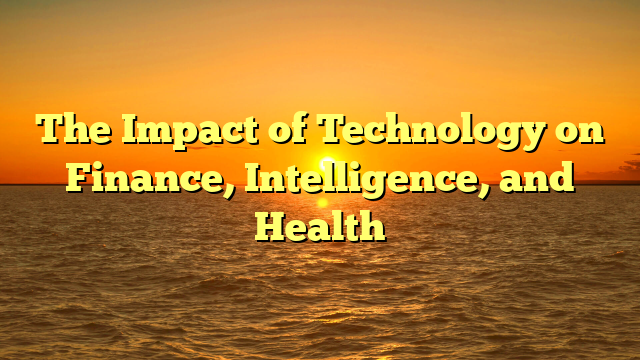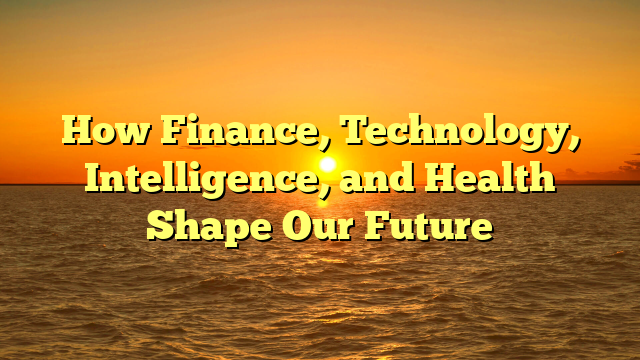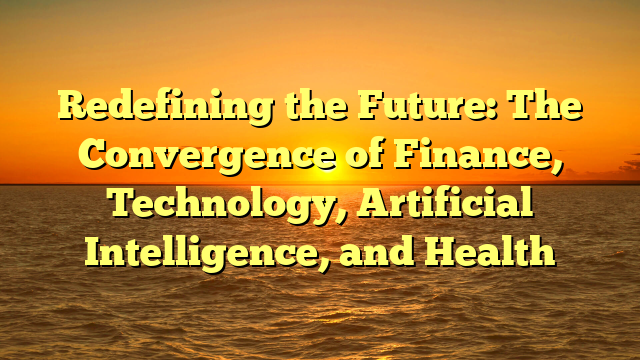
The rapid growth of technological innovation is influencing every aspect of our daily lives. Whether it’s through fintech, the rise of artificial intelligence (AI), or breakthroughs in medical technology, we are witnessing a revolution that is changing how we manage money, how we perceive intelligence, and improve healthcare systems. This article explores how these advancements are reshaping our world in exciting and challenging ways.
Finance and Technology: A Revolutionary Shift
The finance industry has undergone a radical transformation thanks to the advent of technology. In recent years, financial technology has changed the way businesses and individuals manage their money, making banking services more accessible, efficient, and secure.
Among the many technological advancements, blockchain has become a cornerstone of modern finance. It allows for secure, decentralized transactions without the need for traditional intermediaries such as banks. Beyond cryptocurrencies, blockchain is being applied to secure financial contracts and reduce the risk of fraud in the financial system.
In addition, the rise of artificial intelligence (AI) in finance is paving the way for more personalized and data-driven financial solutions. Robo-advisors, powered by AI, provide tailored investment advice based on real-time data and risk profiles, making wealth management services available to a wider audience at lower costs.
The Role of AI in Shaping the Future of Intelligence
AI is often touted as the next frontier in intelligence, as it enables machines to perform tasks that previously required human cognition. From speech recognition to image recognition, AI is capable of tasks that demonstrate its ability to learn, adapt, and even exhibit creativity.
In healthcare, AI is playing a critical role in improving patient outcomes. By analyzing vast amounts of medical data, AI can assist healthcare providers in diagnosing diseases more accurately, recommending treatments, and predicting patient responses. AI’s role in personalized medicine is becoming increasingly important, as it helps tailor treatments to individual genetic profiles.
Moreover, AI is helping to close the divide between human intelligence and machine learning. In fields such as brain-computer interfaces, AI is being used to model and understand the complexities of the human brain, bringing us closer to creating machines that can think and reason in ways that mimic human cognition.
https://www.parasfreeeducation.com and Technology: Transforming the Healthcare System
The healthcare industry is undergoing a digital revolution, driven by advancements in telemedicine, wearable devices, and data analytics. These technologies are improving healthcare delivery, increasing accessibility, and reducing costs.
Telemedicine is one of the most significant advancements in healthcare, especially in areas where access to traditional healthcare services is limited. By allowing patients to consult with doctors remotely, telemedicine is bridging the gap between rural and urban healthcare access, reducing waiting times and ensuring timely care.
In addition, wearable health devices such as fitness trackers and smartwatches are helping individuals take control of their health by providing real-time data on their physical activity, heart rate, sleep patterns, and more. These devices are also contributing to the prevention of diseases, as they can track changes in health metrics and alert users or doctors to potential concerns.
Artificial intelligence is revolutionizing the way healthcare is delivered. AI is being used to analyze vast amounts of patient data, from medical imaging to electronic health records (EHRs), to provide faster and more accurate diagnoses. AI-powered systems are helping healthcare providers identify health risks and offer personalized treatments based on a patient’s unique genetic and medical history.
Conclusion
In summary, technology is at the forefront of transforming finance, intelligence, and healthcare. These sectors are experiencing rapid changes that bring new possibilities and challenges. As we look to the future, staying informed and adapting to these technological advancements will be key to leveraging their potential for personal and societal growth.



